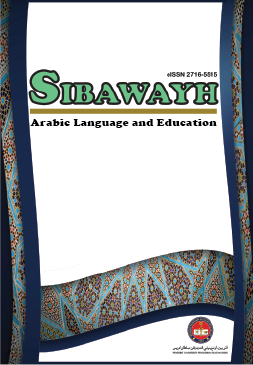ما أُجْمِلَ بِبيان بين قوله تعالى: {فَجَاسُوا} وقوله تعالى {جِئْنَا بِكُمْ لَفِيفًا}
Which Was Most Summarized by a Statement Between the Almighty’s Saying: So They Swam, and the Almighty’s Saying, We Have Brought You a Group of People
DOI:
https://doi.org/10.37134/sibawayh.vol3.1.5.2022Keywords:
مجمل, بيان, تفسير, ديارAbstract
فإن موضوع الإجمال والبيان من المواضيع التي أهتم بها علماء اللغة والبيان والبلاغة؛ ذلك لوجود الإجمال في الكثير من النصوص في القرآن الكريم والسنة النبوية الشريفة، فيأتي البيان إما بنص منهما فيسمى مفسرا، وإما من غير نص عن طريق العقل فيسمى مؤولا. ومما لا شك فيه إن بعض آيات القرآن الكريم تفسر بعضها بعضا، وقد يأتي التفسير عن طريق السنة النبوية الشريفة، وقد يؤول المعنى عند إنعدام النص، فيكون للعقل متسع، وقد يكون اللفظ من حيث الاستعمال إما حقيقة أو مجازا، ويمكن أن يكون صريحا أو كناية، وهذا نجده واضحا في الكثير من النصوص الشرعية، بحثنا يتكلم عن ذلك في ما كان مجملا في سورة الإسراء في قضاء الله تعالى على بني إسرائيل بالإفساد مرتين مع العلو في الأرض، ومن ثم إخباره تعالى في سورة الإسراء بآية مجملة بما يعرف بالسبي الأول، ثم بيان ذلك في آية آخرى توضح مقصوده، مع آية ثالثة تنبؤنا بقرب الموعد الثاني، الآية الأولى أجملت قوله تعالى: {فَإِذَا جَاءَ وَعْدُ أُولَاهُمَا بَعَثْنَا عَلَيْكُمْ عِبَادًا لَنَا أُولِي بَأْسٍ شَدِيدٍ فَجَاسُوا خِلَالَ الدِّيَارِ وَكَانَ وَعْدًا مَفْعُولًا}، والآية الثانية: {إنْ أَحْسَنْتُمْ أَحْسَنْتُمْ لِأَنْفُسِكُمْ وَإِنْ أَسَأْتُمْ فَلَهَا فَإِذَا جَاءَ وَعْدُ الْآخِرَةِ لِيَسُوءُوا وُجُوهَكُمْ وَلِيَدْخُلُوا الْمَسْجِدَ كَمَا دَخَلُوهُ أَوَّلَ مَرَّةٍ وَلِيُتَبِّرُوا مَا عَلَوْا تَتْبِيرًا}، والآية الثالثة: {وَقُلْنَا مِنْ بَعْدِهِ لِبَنِي إِسْرَائِيلَ اسْكُنُوا الْأَرْضَ فَإِذَا جَاءَ وَعْدُ الْآخِرَةِ جِئْنَا بِكُمْ لَفِيفًا}، فالمجمل في الآية الأولى: (عبادا لنا، الديار)، والبيان في الآية الثانية: (المسجد)، والآية الثالثة: المجمل (جئنا بكم لفيفا)، هذا ماسنبحثه أصوليا في هذا البحث ببيان ما نراه مقصود الشارع من ذلك الإجمال والبيان.
Downloads
References
ابن كثير، إ. ب. ع. (١٩٧٦م). السيرة النبوية (من البداية والنهاية، تحقيق: م. ع. الواحد). دار المعرفة، بيروت.
ابن كثير، إ. ب. ع. (١٩٨٨م). البداية والنهاية (ط. ١، تحقيق: ع. شيري). دار إحياء التراث العربي.
ابن كثير، أ. ف. إ. ب. ع. (١٩٩٨م). تفسير القرآن العظيم (ط. ١، تحقيق: م. ح. ش. الدين). دار الكتب العلمية.
ابن منظور، م. ب. م. (١٩٩٤م). لسان العرب (ط. ٣). دار صادر، بيروت.
أحمد، أ. ب. ح. (٢٠٠١م). مسند الإمام أحمد بن حنبل (ط. ١، تحقيق: ش. الأرناؤوط، ع. مرشد، وآخرون، إشراف: ع. بن ع. المحسن التركي). مؤسسة الرسالة.
الآمدي، س. ا. ع. ب. أ. ع. (١٩٨٣م). كتاب الإحكام في أصول الأحكام (ط. ١، تحقيق: س. الجميلي). دار الكتاب العربي.
البخاري، أ. ع. م. ب. إ. (٢٠٠٢م). الجامع الصحيح المعروف بصحيح البخاري (ط. ١، تحقيق: م. ز. ب. ن. الناصر). دار طوق النجاة.
البغوي، أ. م. ا. ب. م. (٢٠٠٠م). معالم التنزيل في تفسير القرآن (ط. ١، تحقيق: ع. المهدي). دار إحياء التراث العربي.
البيضاوي، ع. ب. م. ا. ح. (د.ت). أصول البيضاوي – كنز الوصول إلى معرفة الأصول. مطبعة جاويد برس، كراتشي، باكستان.
حمزة، أ. م. ع. ا. (٢٠١٧م). أسباب الإجمال في الكتاب والسنة وأثرها في الاستنباط (ط. ٢). دار الفتح، القاهرة.
الرازي، ف. ا. م. ب. ع. (٢٠٠٠م). مفاتيح الغيب (التفسير الكبير) (ط. ٣). دار إحياء التراث العربي، بيروت.
الزمخشري، أ. ق. م. ب. ع. (١٩٨٧م). الكشاف عن حقائق غوامض التنزيل (ط. ٣). دار الكتاب العربي، بيروت.
السرخسي، م. ب. أ. أ. ب. (١٩٩٣م). أصول السرخسي (ط. ١، تحقيق: أ. الوفاء الأفغاني). دار الكتاب العلمية، بيروت.
السنهـاجي، ع. ح. ب. م. ب. ب. (١٩٨٨م). مبادئ الأصول (ط. ٢، تحقيق: ع. الطالبي). الشركة الوطنية للكتاب، الجزائر.
الطبري، م. ب. ج. (٢٠٠٠م). جامع البيان في تأويل القرآن (ط. ١، تحقيق: أ. م. شاكر). مؤسسة الرسالة.
عيد، م. ر. (٢٠٠٢م). تاريخ نزول القرآن (ط. ١). دار الوفاء، المنصورة، مصر.
الفارابي، أ. ح. أ. ب. ف. ب. ز. ا. ر. (١٩٧٩م). معجم مقاييس اللغة (تحقيق: ع. م. هارون). دار الفكر، بيروت.
المقريزي، ت. ا. أ. ب. ع. (١٩٩٩م). إمتاع الأسماع بما للنبي من الأحوال والأموال والحفدة والمتاع (ط. ١، تحقيق: م. ع. الح. النميسي). دار الكتب العلمية.
المنهاجي الشافعي، ش. ا. م. ب. أ. (١٩٨٢–١٩٨٤م). إتحاف الأخصا بفضائل المسجد الأقصى (تحقيق: أ. ر. أ.). الهيئة المصرية العامة للكتب.
النملة، ع. ك. ب. ع. (١٩٩٩م). المهذب في علم أصول الفقه المقارن (ط. ١). مكتبة الرشد، الرياض.
Downloads
Published
Issue
Section
License
Copyright (c) 2022 Abdulkareem Omar Abdulkareem

This work is licensed under a Creative Commons Attribution-NonCommercial-ShareAlike 4.0 International License.





